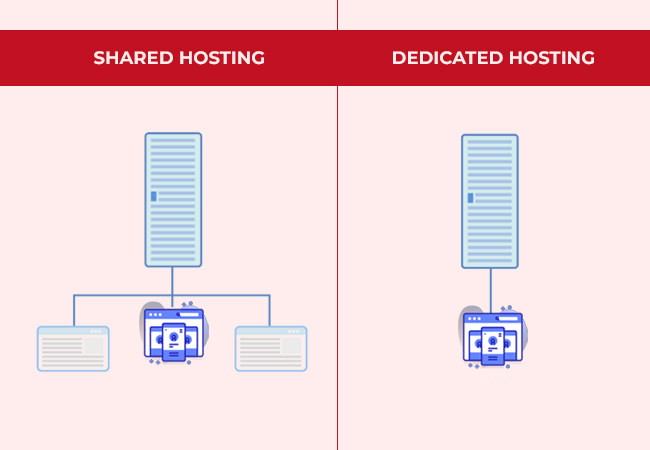Table of Contents
Choosing the Best Option for Your Website
Choosing the right hosting solution is very important for your website’s overall performance, security, and long-term growth. Among various hosting options available, shared hosting and dedicated hosting are two of the most widely used solutions, with their own different advantages. Shared hosting is an inexpensive, user-friendly option, perfect for smaller websites with basic needs and lower traffic. It provides an excellent value for those websites that don’t require high server control or performance.
Dedicated hosting provides the exclusive use of the server resources. This will make sure that it is a more superior performance and faster loading, and the site is very secure. It is great for high-traffic websites or resource-intensive applications that demand more power, customization, and flexibility. While the price is much higher, it will ensure your site runs even under heavy traffic, making it a better choice for growing businesses or complex websites.
This guide will take you through the key differences, advantages, and drawbacks of each hosting type, so you will be better equipped to choose the best one for your website based on its specific needs.

Introduction
Web hosting isn’t a one-size-fits-all solution. Whether you’re managing a personal blog or a high-traffic e-commerce site, choosing between shared and dedicated hosting is crucial. Shared hosting is cost-effective and easy to manage, making it a great choice for smaller sites. Dedicated hosting, on the other hand, provides better performance, control, and security, making it ideal for larger, more resource-intensive websites. In this guide, we will compare these options to help you decide which one is best suited for your site’s needs.
Shared hosting is an affordable and popular option that allows multiple websites to share the same server resources, such as CPU, RAM, storage, and bandwidth. Since these resources are shared among many customers, shared hosting is considered a budget-friendly solution, making it a great choice for smaller websites or newly launched projects. This type of hosting is ideal for personal blogs, small business sites, or any websites with low traffic that don’t require advanced features.
While shared hosting is cost-effective, it comes with some limitations. Since server resources are distributed among multiple websites, performance can be affected during periods of high traffic from other sites on the same server. Additionally, customization options are limited, as users do not have full control over server configurations. However, for those starting out or managing smaller sites, shared hosting remains an excellent solution, offering essential features without the complexity and high costs associated with other hosting types.

- Cost-Effective: Shared hosting is cheap, meaning it is ideal for any individual, small businesses, and start-ups who wish to keep it cost-effective. Sharing server resources with other websites enables you to get quality hosting at fractional costs of the more advanced solutions.
- Easy to Use: Most shared hosting plans come with easy-to-use control panels like cPanel, which makes website management accessible for beginners. You don’t need technical expertise to get your site up and running, and you can manage everything from domain settings to website files with just a few clicks.
- Scalable: Many shared hosting providers offer scalable plans, meaning you can easily upgrade your resources as your website grows. This flexibility allows you to start with a basic plan and scale up without the hassle of migrating your website to a new server, ensuring you won’t outgrow your hosting too quickly.
- Maintenance-Free: With shared hosting, the hosting provider takes care of server maintenance, updates, and security. This means you don’t have to worry about the technical details, such as patching software or ensuring the server is secure. You can focus on growing your website while the provider manages the backend operations.
- Limited Resources: Shared hosting implies that your website shares server resources like CPU, RAM, storage, and bandwidth with multiple other websites. If one of these sites experiences a sudden traffic spike, it can lead to performance slowdowns or interruptions for your site. This resource-sharing model can be a disadvantage for websites expecting steady growth or those with fluctuating traffic.
- Less Control: You will have limited control over server configurations in a shared hosting environment. Unlike dedicated hosting, where you can tweak the server to meet specific needs, shared hosting restricts you to basic settings that are managed by the provider. This makes shared hosting less suitable for websites requiring advanced performance optimizations or custom configurations.
- Security Risks: As several websites are on the same server, security risks increase. The hosting provider implements firewalls and malware protection but shares the environment with your site; thus, there is a possibility that other sites on the same server could compromise your site’s security. Although your site might be secure, it is vulnerable to problems with other websites on the server.
- Performance Variation: In shared hosting, the performance may be inconsistent because of the other sites on the server using too much of the resources. The loading time and responsiveness of your site can vary with other activities on the same server. Such inconsistency can hurt the user experience, especially in high-traffic sites or applications that are resource-intensive.
Dedicated hosting allocates an entire server exclusively to your website, meaning there are no other websites sharing the resources on that server. This provides a significant performance boost since your site has full access to all the server’s resources, resulting in faster loading times, improved website responsiveness, and better overall performance. Additionally, dedicated hosting offers enhanced security since there’s no risk of other websites on the server potentially compromising your data.
Dedicated hosting is advantageous because it allows a high degree of control. You can configure the server according to your needs, install custom software, and make adjustments to optimize your website’s performance. It is therefore the best solution for high-traffic websites, complex applications, or those requiring special server configurations. Dedicated hosting is the most reliable and scalable, because it allows you to easily upgrade server components for growing resource demands. It is suitable for businesses or websites with high performance or security demands.

- Unmatched Performance: Dedicated hosting provides better performance as it gives your website server resources exclusively, so your site may handle huge amounts of traffic, run applications that have tens of sophisticated code lines, and load in seconds without other sites affecting its performance. You can offer your visitors a seamless and responsive experience by having dedicated resources, which are not affected by traffic spikes.
- Tight Control : Dedicated hosting provides you with complete control over the server environment. You can customize the server settings, install specific software, configure firewalls, and implement security measures tailored to your website’s unique requirements. This level of control allows you to optimize the server to suit your needs, ensuring that your website runs smoothly and efficiently.
- Better Security : With no other websites sharing the server, dedicated hosting offers a more secure environment for your website. This isolation reduces the risk of security breaches from neighboring sites. You have the flexibility to install custom security software, conduct regular security audits, and implement strict security protocols, ensuring your website and its data are well protected.
- Scalable for Growth : Dedicated hosting is scalable, which means the RAM, storage, and CPU on your server can be effortlessly upgraded in light of increasing business. This flexibility important to ensure scalability of your hosting solution as your growing resource requirements are satisfied, and the performance remains high with reliability in case of a booming business.
- Higher Cost: Dedicated hosting is a premium solution, and its price reflects the exclusive resources and advanced features it offers. While it provides unparalleled performance, security, and customization options, these benefits come at a higher cost compared to shared hosting. The price is justified by the dedicated server, which ensures your website gets all the resources it needs without sharing with other sites. This places it as one of the best for high-traffic websites or with complex needs, but pretty far out of range for smaller sites with tighter budgets.
- Technical Expertise Needed : Dedicated hosting requires some technical knowledge and expertise. In shared hosting, most of the technical work is done by the provider. In dedicated hosting, you have to maintain, configure, and secure the server. If you do not have in-house IT professionals, you will need to hire a system administrator to manage the server properly. This can be a disadvantage for businesses that do not have the technical resources to carry out such added responsibilities and require specialized knowledge.
Compare the offerings from major providers such as AWS, Azure, and DigitalOcean. Consider their pros and cons:
| Feature | Shared Hosting | Dedicated Hosting |
|---|---|---|
| Performance | Limited by shared server resources | Full access to dedicated resources |
| Cost | Budget-friendly, low monthly fees | Premium pricing, higher monthly costs |
| Control | Limited control over server settings | Full control over server configuration |
| Security | Shared security risks | Enhanced security, full isolation |
| Customization | Limited customization options | Extensive customization for software, configurations, etc. |
| Traffic Handling | Can struggle with high traffic spikes | Can handle high traffic loads with ease |
| Scalability | Easy to upgrade within plan options | Highly scalable based on resource requirements |
- Small Sites: Shared hosting is ideal for personal blogs, portfolios, or small business websites that experience low traffic and have straightforward requirements. These sites do not need advanced features or high server resources, so shared hosting will prove efficient and practical for them.
- Budget-Sensitive Users: If your budget is limited but you don’t need to control the server, customize, or ensure extreme performance, shared hosting provides the best value and reliability at that price. It’s perfect for starting an online presence without breaking the bank, suitable for beginning startups or a personal online presence.
- Easy Management: Shared hosting is the best option for new users because it makes managing a website easier. It takes away the frustration of having to deal with the complicated configurations of a server because shared hosting comes with user-friendly control panels and an easy setup process, which will make anyone have their website online in no time.
Migrating data to the cloud can be a straightforward process if handled properly. Begin by backing up all existing data to avoid any potential loss during migration. This can be done by creating local backups or using backup services provided by your current hosting provider.
Once you’ve ensured your data is safe, leverage the migration tools offered by your cloud hosting provider. Most cloud services provide built-in tools that simplify data transfer, making the process faster and less prone to error.
Before going live with your new cloud setup, conduct thorough testing. Verify that all your data has migrated successfully, your applications are functioning properly, and the setup performs as expected. Testing will help ensure a smooth transition with minimal downtime, allowing your business operations to continue seamlessly.
When to Choose Dedicated Hosting:
- High-Traffic Websites: Dedicated hosting is the perfect solution for high-traffic websites, such as e-commerce platforms, online applications, or media sites. Since you have an entire server dedicated to your website, its performance remains unaffected by other websites, even during traffic spikes. This ensures that your visitors experience fast loading times and seamless navigation, regardless of how many users are accessing your site at the same time.
- Security Concerns: If your website deals with sensitive data, like customer payment details or personal information, dedicated hosting provides enhanced security. Since your site is the only one on the server, it’s isolated from potential vulnerabilities caused by other sites sharing the same resources. This gives you the freedom to implement custom security measures, ensuring that your website is protected with the highest standards of safety and compliance.
- Custom Requirements: For websites with specific needs—whether it’s custom software, specialized configurations, or advanced performance optimizations—dedicated hosting offers the flexibility to tailor the server environment. This level of control allows you to adjust server settings, install specialized applications, and optimize resources for peak performance. Whether you’re running complex applications or need a high level of customization, dedicated hosting ensures you have the freedom to meet your website’s unique requirements.
Conclusion: Which Hosting is Right for You?
Depending on the size of the website, as well as your budget, traffic volume, and technical requirements, shared hosting versus dedicated hosting could decide for you. Here’s the point: shared hosting is a viable option for beginners or small websites, as it offers great value at a low price and requires minimal maintenance. This kind of hosting is ideal for websites that don’t experience heavy traffic or require specialized customization. It provides essential resources at an affordable price, making it perfect for personal blogs, small business sites, or portfolios that don’t need extensive server configurations
Dedicated hosting is best suited for larger websites, or high-traffic e-commerce platforms and applications that require high performance, full control, and robust security. Dedicated hosting gives you exclusive access to all server resources so that your website will never be slowed down by the performance of other websites sharing the same server. It offers better scalability, allowing you to upgrade hardware as your needs grow, and full customization options for server configurations, software installations, and security protocols. This makes it the best choice for complex websites or applications where performance and security are top priorities.
-

Abilash P
SEO ExecutiveAbilash P is a Digital Marketer and SEO Enthusiast with experience in content creation and data analytics. His goal is to simplify digital strategies for businesses and individuals, helping brands boost their online presence and connect effectively with their audiences. When he’s not focused on marketing trends, he enjoys exploring new cuisines.
